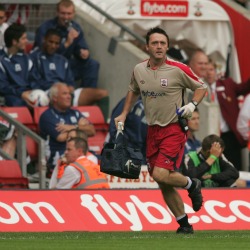Muscles are made up of millions of fibres. These can become overloaded in an acute action and chronic. Muscle injuries due to a mechanical stress normally occur when the muscle is overloaded in an eccentric – or over-stretching of the muscle. This can occur at any time you are straining the muscle, from sprinting in a game of football to lifting something too heavy to missing a step, falling and hoping no-one saw.
During my time at Southampton Football Club, I researched and developed the best way to treat muscle tears from day one. I would start treatment immediately a muscle tear occurred.
Depending on the number of fibres depends on the severity:
Grade I (mild) strains affect only a limited number of fibres in the muscle. There is no decrease in strength and there is a fully active and passive range of motion. Pain and tenderness are often delayed to the next day.
Grade II (moderate) strains have nearly half of muscle fibres torn. Acute and significant pain is accompanied by swelling and a minor decrease in muscle strength.
Grade III (severe) strains represent the complete rupture of the muscle. This means either the tendon is separated from the muscle belly or the muscle belly is actually torn in 2 parts. Severe swelling and pain and a complete loss of function are characteristic of this type of strain.
If you have a significant grade II or a grade III and are advised to have this repaired, this must be undertaken as soon as possible (same day), deferring or refusing surgery severely affects your long term prognosis.
Self management includes: POLICE – Protection Optimal Load Ice Compression Elevation. Optimal load is probably the only major innovation. In this way, the injured muscle will rest, but a balanced progressive rehabilitation program should gradually introduce controlled mechanical stresses, different according to the affected site, and athletic feats determined by involved muscles.
At this stage, manual therapy consisting of specific massages aiding the drainage of the tissues not compromised, close to the site of injury, may improve the disposal of inflammatory catabolites. Functional compressive bandages may also aid to reduce local pressure, improve pain, and optimise the effects of physiotherapy and rehabilitation.
I will start manual therapy on day 1 if indicated and with thorough rehabilitation. Early intervention with the correct use of my knowledge and experience speeds up the healing process manyfold.
I predict an injury which would normally take 10 to 12 weeks to recover will take about 3 weeks.
This is how I significantly reduced the rehabilitation times when working at Southampton Football Club and how I can do it for you too.

